If so, I’d really appreciate your help filling in this survey. I love reading and writing After-Action Reports and Let’s Plays, and I’d like to start a spin-off website collecting them (effectively, Twitch for the written word). The survey will only take a couple of minutes and will help me refine ideas for the website. Results so far can be seen here – thanks for your help!
Month: May 2016
Musical Monday: “Faster than Light (instrumental)” (Stellaris), composed by Andreas Waldetoft
This is one of my favourite pieces of music in Stellaris, embodying the game’s – and the science fiction genre’s – spirit of exploration and discovery. At its start, it’s understated and almost ethereal; it takes on a questing, inquisitive tone around 0:45; and finally blossoms into liveliness at 2:40. Enjoy!
Clippings: Civilising the Kaldwins
2016 looks to be a bumper year for strategy games, based on the release of XCOM 2 (my current pick for GOTY), Banner Saga 2, Stellaris, Total War: Warhammer, Hearts of Iron IV, and now Civilization VI. While the Civ 6 previews all seem to be based on the same briefing, PC Gamer has also conducted a follow-up interview.
In other news:
- Tim Stone at the Flare Path has a glowing write-up of Sengoku Jidai: Shadow of the Shogun, Slitherine’s new Japan-themed wargame.
- In a surprise move, Eugen Systems has announced the Netherlands as a new DLC faction for Wargame: Red Dragon. This will be the first paid DLC in the history of the Wargame franchise – all previous updates have been “freeLC”.
- Here is additional detail on Dishonored 2, including the respective powers of its two protagonists (Corvo and Emily), courtesy of PC Gamer.
- Nintendo has confirmed its interest in licensing its IP to movie creators, most likely in the form of CGI or anime.
- RIP the Disney Infinity toys-to-life franchise.
Space Opera, Act I: Thoughts on Stellaris
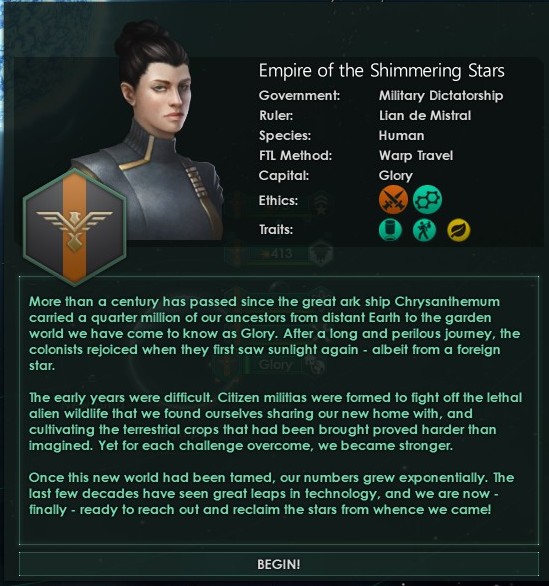 Humanity triumphant! My first game of Stellaris was a short one, as my fledgling humans were ground to dust by a nearby computer player. My second was more successful. Under the banner of the Empire of the Shimmering Stars, humanity spread out from the Deneb system – befriending the pre-spaceflight Immathurans, bringing more species and more worlds under its sway.
Humanity triumphant! My first game of Stellaris was a short one, as my fledgling humans were ground to dust by a nearby computer player. My second was more successful. Under the banner of the Empire of the Shimmering Stars, humanity spread out from the Deneb system – befriending the pre-spaceflight Immathurans, bringing more species and more worlds under its sway.
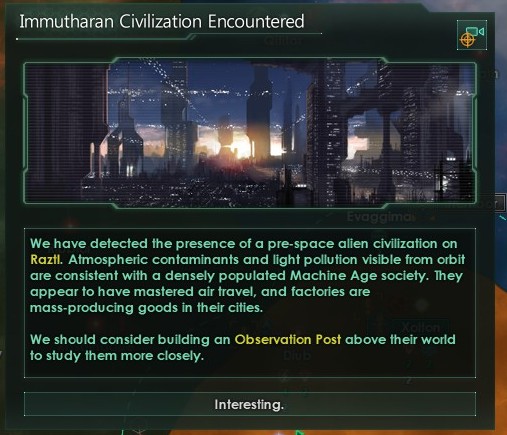 Some of humanity’s neighbours turned out to be friendly, or at least benevolent neutrals. I signed migration treaties, allowing us to populate one another’s worlds. Some were hostile. When my first spacefleet was destroyed in a bid to protect my Immathuran proteges, I built a second one, the Remembrance Fleet. The Remembrance Fleet went on to turn the tables, and the would-be aggressors became first vassals and then subjects.
Some of humanity’s neighbours turned out to be friendly, or at least benevolent neutrals. I signed migration treaties, allowing us to populate one another’s worlds. Some were hostile. When my first spacefleet was destroyed in a bid to protect my Immathuran proteges, I built a second one, the Remembrance Fleet. The Remembrance Fleet went on to turn the tables, and the would-be aggressors became first vassals and then subjects.
On and on the human tide rolled, until finally I stretched too far. The Ubaric Progenitors, an ancient “Fallen Empire” (ornery precursor races populating the Stellaris galaxy), objected to my colonies near their borders. The Remembrance Fleet fought them off – just. I attempted to take the war to the Ubari capital, an ancient ringworld. It was a disaster: the combined Ubari forces crushed mine. In the ensuing peace treaty, the Ubari forced me to abandon a swathe of colonies, and to add insult to injury, assassinated my leader.
Fortunately, the Shimmering Stars had the size and strategic depth to recover. Rebuilt newer and stronger, my Grand Fleet fought off an extra-galactic invasion (one of Stellaris’ “late-game crises”)… and returned to unfinished business. Once again, a human fleet, supported by allied and vassal contingents, appeared above the Ubari ringworld.
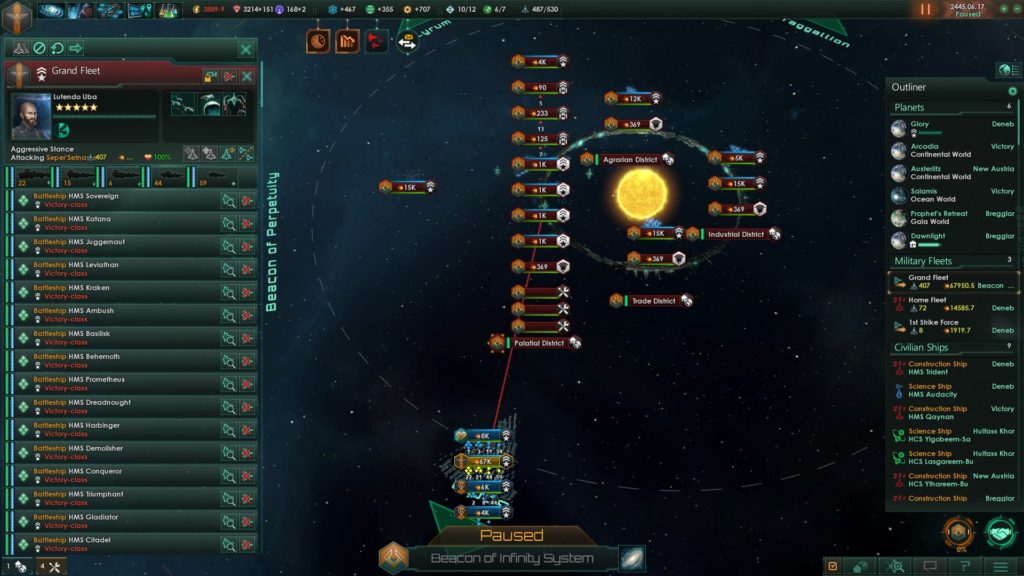 This time, the allies outgunned the Ubari several times to one. One by one, the Ubari warships and starbases winked out. The Ubari leaders surrendered. The bronze eagle flag of the Shimmering Stars flew over a ringworld that was already old when the first humans rubbed sticks together to make fire.
This time, the allies outgunned the Ubari several times to one. One by one, the Ubari warships and starbases winked out. The Ubari leaders surrendered. The bronze eagle flag of the Shimmering Stars flew over a ringworld that was already old when the first humans rubbed sticks together to make fire.
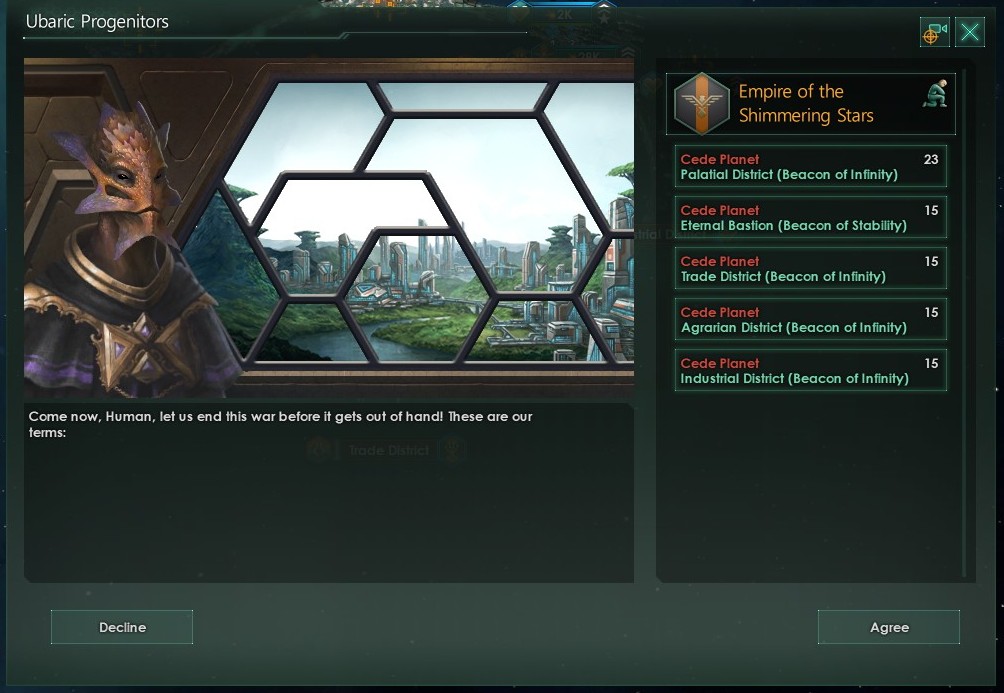 Humanity now presides over the galaxy’s dominant empire. No threats remain. The empire itself is home to many species, most co-existing happily, and its highest offices are open to leaders from all species. That, for me, is victory!
Humanity now presides over the galaxy’s dominant empire. No threats remain. The empire itself is home to many species, most co-existing happily, and its highest offices are open to leaders from all species. That, for me, is victory!
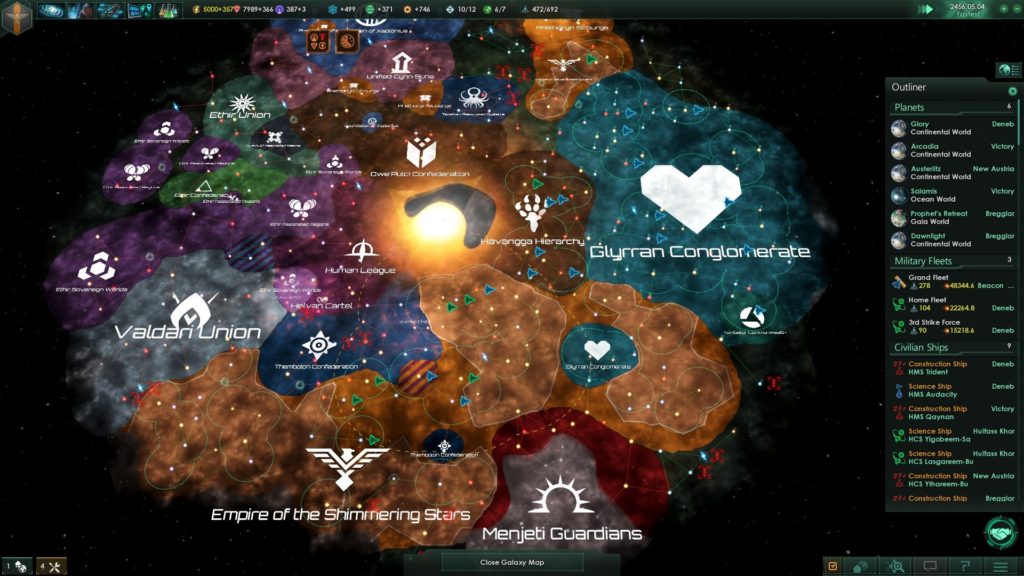 Good game, 1-2 expansions away from potential greatness. Stellaris’ appeal rested on two promises: (1) a vibrant science-fiction universe, and (2) blending Paradox’s specialty, the grand strategy game, with the established space 4X genre. It delivers on the first; I am not convinced it delivers on the second, as its limited internal politics feel more like a traditional 4X. I suspect players will enjoy it to the extent they’re looking for an interactive science fiction epic rather than a crunchy GSG. Overall, I enjoyed my 20 hours with Stellaris, and I look forward to playing again several patches down the road. (Update: the developers have posted their roadmap for the next few updates, which look great! They address many of my issues with the game.)
Good game, 1-2 expansions away from potential greatness. Stellaris’ appeal rested on two promises: (1) a vibrant science-fiction universe, and (2) blending Paradox’s specialty, the grand strategy game, with the established space 4X genre. It delivers on the first; I am not convinced it delivers on the second, as its limited internal politics feel more like a traditional 4X. I suspect players will enjoy it to the extent they’re looking for an interactive science fiction epic rather than a crunchy GSG. Overall, I enjoyed my 20 hours with Stellaris, and I look forward to playing again several patches down the road. (Update: the developers have posted their roadmap for the next few updates, which look great! They address many of my issues with the game.)
Below, I elaborate:
Musical Monday: “Brothers in Arms” (Mad Max: Fury Road), composed by Tom Holkenborg
Welcome back to Musical Monday. To celebrate the release anniversary of Mad Max: Fury Road, I present my favourite track from the movie. An action theme through and through (it plays during the canyon sequence), it begins all clash and discordance, before working up to the more hopeful note at 3:00. Enjoy!
Clippings
The next month will be busy with strategy releases – Stellaris, Total War: Warhammer, and Hearts of Iron 4. Look forward to my Stellaris coverage once the game is out next week!
Further out, Relic has announced Dawn of War 3 – details at PC Gamer.
Interesting times for console games, with Nintendo confirming the NX for 2017 (do check out this Q&A from Nintendo’s FY16 earnings announcement), and Sony and Microsoft rumoured to be working on refreshed hardware. This retrospective on 2006 – when the PS3’s US$599 price was revealed – makes for an interesting comparison.
The Banner Saga 2 is out to a positive reception (Metacritic score 83 at time of writing). I like IGN’s and PC Invasion’s reviews – be warned that they contain spoilers for the first game.
Finally, fantasy and anime fans might be interested in this comparison of epic fantasy and shounen anime – one about heroes summoned by an external call, the other about heroes driven (or so argues that piece). Note that Django Wexler, who wrote the article, is the author of the crackingly good Shadow Campaigns series, a military/political fantasy inspired by the career of Napoleon Bonaparte. I look forward to the next in that series!